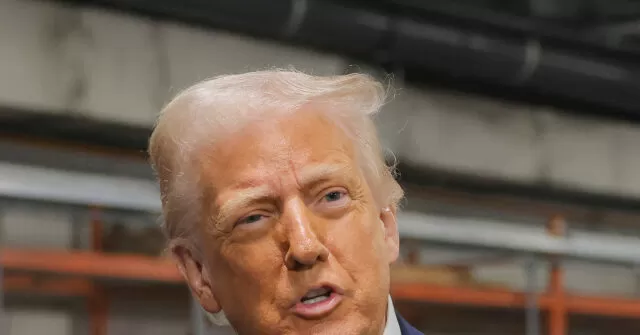President Donald Trump has once again made headlines, this time by revealing that a National Security Council staffer and aide to National Security Advisor Mike Waltz added the editor-in-chief of The Atlantic, Jeffrey Goldberg, to a Signal group chat discussing military strikes against the Houthis. The shocking revelation has brought attention to the ongoing conflict in Yemen and the United States’ involvement in it.
According to President Trump, the group chat was created to discuss possible military strikes against the Houthi rebels in Yemen. The National Security Council staffer reportedly added Goldberg to the chat without authorization, and now the President has shed light on this questionable action.
The Atlantic, a well-respected and renowned publication, has been known for its critical coverage of the Trump administration. In recent weeks, the magazine published a controversial article alleging that the President called fallen soldiers “losers” and “suckers.” The article, which cited anonymous sources, sparked backlash and denials from the White House.
President Trump has been vocal about his dissatisfaction with the media, frequently accusing them of spreading fake news and attacking his administration. This latest revelation is another example of what he sees as biased and unfair reporting. He believes that by adding Goldberg, the NSC staffer was trying to manipulate the media and paint a negative picture of his administration’s actions.
The National Security Council is a group of advisors and experts who provide guidance to the President on matters of national security and foreign policy. They play a crucial role in shaping the country’s response to global issues and potential threats. The fact that a junior staff member took it upon themselves to add a journalist to a classified group chat is concerning and raises questions about the administration’s handling of sensitive information.
President Trump has called the incident a “disgrace” and has vowed to get to the bottom of it. He has also expressed his disappointment and anger towards the NSC staffer for their actions. The National Security Council has launched an investigation into the matter, and the President has promised to hold those responsible accountable.
The addition of Jeffrey Goldberg to the group chat has also brought attention to the ongoing conflict in Yemen and the United States’ involvement in it. The Houthis, a rebel group backed by Iran, have been fighting against the Yemeni government since 2014. The conflict has devastated the country, causing thousands of civilian deaths and creating a humanitarian crisis. The United States has been supporting the Saudi-led coalition’s efforts to defeat the rebels, providing weapons and military support.
However, the U.S.’s involvement in this conflict has been the subject of much criticism and debate. Many believe that the U.S. should not be involved in a proxy war with Iran and that innocent civilians are paying the price for it. The addition of a journalist to a group chat discussing potential military strikes only adds to the controversy and raises concerns about the justification for the U.S.’s involvement in this conflict.
The Trump administration has not commented on the specifics of the Signal group chat, but the President has reiterated his commitment to ending the conflict in Yemen. He has stated that his administration is working towards a peaceful resolution and hopes to see an end to the violence soon. The National Security Council has also announced plans to review the U.S.’s support for the Saudi-led coalition and reassess its role in the conflict.
In conclusion, President Trump’s revelation about the NSC staffer adding The Atlantic’s editor-in-chief to a Signal group chat has brought attention to the ongoing conflict in Yemen and raised concerns about the U.S.’s involvement in it. The incident has also highlighted the need for accountability and proper handling of classified information within the administration. As the investigation continues, it remains to be seen how this will impact the U.S.’s role in the Yemen conflict and the relationship between the media and the administration.





![Complete BritRail Pass Guide [Types, How to Use It, Pros + Cons]](https://inside-news.uk/wp-content/uploads/2025/06/00221EB4-BCA2-4DBB-6CD4-83DBC37D71FA-120x86.webp)












